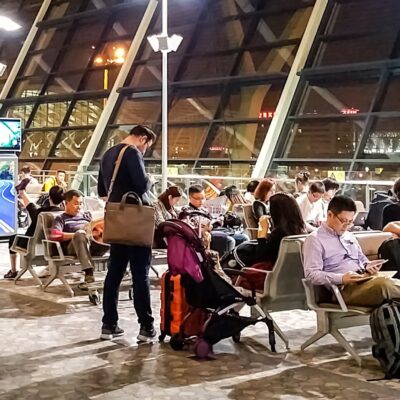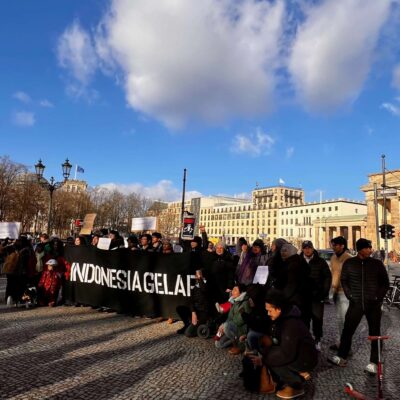One of South Korea’s most intriguing civic engagement techniques are so called general election ‘Drop’ or ‘No Nomination, No Vote’ campaigns (Kr. nak’cheon nak’seon undong, 낙천낙선운동, 落薦落選運動), which have been carried out at recent elections by temporary networks comprising of dozens (and sometimes even hundreds) of NGOs.
The ‘selection and election drop’ campaigns comprise of two elements: nak’cheon and nak’seon. These are defined by South Korea’s largest civil society group, the People’s Solidarity for Participatory Democracy (PSPD, Kr. 참여연대, 參與聯隊), as:
- Nak’cheon: ‘…a movement in which voters or civil society organisations express public opposition to candidates based on criteria such a history of corrupt or anti-reform activities, with the aim to prevent nomination and election’
- Nak’seon: ‘…a movement aimed at identifying and eliminating unsuitable candidates during the candidate selection process at party level, including primary elections and internal nomination reviews.’
In other words, while the ‘selection drop’ movement focuses on eliminating ‘unsuitable’ potential candidates during a party’s candidate selection process, the ‘election drop’ movement aims to do the same during the general election (post candidate registration).
The work of civic groups such as the PSPD has contributed to legislative and policy reforms and has also played a vital role in shaping public opinion and political discourse in South Korea’s young democracy.
Recent political background
The emergence of PMOs in South Korea such as the PSPD can be traced back to the late 20th century, a period marked by rapid socio-economic change, including the ‘Miracle of the Han River’, and a strong push for democratisation towards the late 1980s. South Korea’s transition from authoritarian rule under dictators such as Park Chung-hee (1963-1979) and Chun Doo-hwan (1980-1988) to a more open and democratic political system in the late 1980s created fertile ground for the growth of civic groups. Groups such as PSPD have since capitalised on the increased political openness to advocate for policy reforms, monitor parliamentary actions, and engage the public in political discourse, thereby reinforcing the foundations of South Korea’s democratic system and often serving as a role model for neighbouring nations in Asia.
The socio-political background of South Korea during the 1990s, when the PSPD was established, was characterised by a complex interplay of forces seeking to consolidate democratic gains while navigating the challenges of rapid industrialisation and integration into the global economy. Late 1997 saw South Korea plunged into the Asian Financial Crisis, also simply known as ‘IMF’ in South Korea, named after the International Monetary Fund. The IMF-imposed economic reforms saw South Korea pivot towards cultural exports which later saw the rise of South Korean popular culture exports also known as the ‘Korean Wave’ or ‘Hallyu’.
The late 1990s in South Korea were, therefore, both a truly tumultuous and dynamic time, economically, culturally, and politically. The PSPD and similar organisations emerged in response to public demand for greater accountability from political and economic elites and have played a crucial role in mobilising citizen participation in the democratic process.
The PSPD
The PSPD, founded in 1994, is sometimes referred to as a ‘shareholder activist group’. It is far more than just a PMO, as far as traditional definitions are concerned. It is a conglomerate Non-Government Organisation (NGO) with, according to latest statistics, over 16,000 members across South Korea. It is completely independent and self-funded through membership dues, with an intricate, multi-level structure of governance, comprising of a secretariat and five departments which are then further divided into several specialist teams. Although donations are uncapped, the PSPD’s strict financial regulations prioritise non-reliance on any single source of funding, with all finances made transparent in regular reports. The PSPD’s financial regulations are further maintained through a multi-stage decision-making process, making it difficult for any individual donor to influence the organisation. Activities that fall within the domain of parliamentary monitoring are conducted by the ‘Authority Monitoring Department’ (Kr. gwolli gamsi guk, 권력감시국) and include a ‘Center for Judicial Watch’ (Kr. sabeop gamsi senteo, 사법감시센터), ‘Center for Legislative Watch’ (Kr. wijeong gamsi senteo, 의정감시센터), ‘Public Interest Law Centre’ (Kr. gongik’beop senteo, 공익법센터), ‘Center for Administrative Watch’ (Kr. haengjeong gamsi senteo, 행정감시센터), and ‘Center for Whistle-blower Support’ (Kr. gongik jebo jiwon senteo, 공익제보지원센터).
The PSPD’s activities have ranged from policy advocacy and legislative monitoring to legal support and public education initiatives. It has made notable contributions to significant democratic reforms in South Korea, including improvements in election laws, enhancement of transparency in political financing, and the promotion of human rights and social justice including gender equality, marriage rights, and better work conditions.
‘Drop Campaigns’: the nak’cheon and nak’seon movements
Drop campaigns were first carried out during the 16th general elections held in April 2000. The most recent 2024 general election (general elections are held every four years in South Korea) saw the formation of the ‘General Elections Civil Network’ (GECN) spearheaded by the PSPD in collaboration with 73 other South Korean NGOs including Citizens’ Coalition for Economic Justice (CCEJ) and Korean Environmental Council (KEC).
GECN collates information from select sources including parliamentary activity monitored by the PSPD before establishing a variety of criteria to determine a list of ‘unsuitable’ candidates ahead of the general election. Criteria include any history of corrupt activities such as bribery and violation of election laws, failure to pass reform bills and policies in a timely manner, records of anti-human rights/anti-constitutional behaviour, and failure to demonstrate ‘morality’ (such as drink-driving and sexual harassment and/or assault) due diligence in legislative practices (such as unreasonable or unjustified obstruction of bill reform); and failure to perform civil duties (such as compulsory military service (for men), and paying taxes).
Once a list of ‘unsuitable’ candidates has been established, the network calls a media conference to launch the ‘drop movement’, announcing the criteria as well as their recommendations for selection and election drops for the impending general election round.
Drop movement outcomes
To date, ‘drop movements’ have been carried out at general elections in South Korea in 2000, 2004, 2012, 2016, and 2024. The campaigns have seen the following results:

Overall, the combined rate of success in ‘dropping candidates’ from party selection and then defeating any remaining ones during the elections has been well over 50 percent, indicating the efficacy of such campaigns in helping the public make informed voting decisions.
Controversies and challenges
Some politicians have branded ‘selection and election drop’ campaigns ‘illegal’. Such arguments have, in turn, led to restrictions on how organisations may engage with voters, which have increasingly impacted on the activities of civic groups during elections. For example, after the 17th general elections held in April 2000, representatives of the GECN were fined after being found to have conduced ‘illegal’ campaigns on technical grounds, largely because of their use of modes of communication banned by elections laws (e.g., distribution of printed materials, assemblies, use of loudspeakers, and street marches). However, as PSPD noted according to Article 87 of the Public Official Election Act, ‘it is legal for civic groups to support or oppose specific parties or candidates and to encourage such actions from the public…as well as activities such as press conferences, operation of websites, newsletters to members, phone campaigns, and letters’.
Despite full transparency in the formulation of drop campaign criteria and the selection process, civic groups engaging in ‘drop campaigns’ have also faced scepticism surrounding their impartiality with conspiracy theories regarding perceived political agendas and partisan actions. The PSPD has maintained that candidate lists are impartial, with ‘unsuitable’ candidates from most parties. The PSPD also maintains that non-partisan civic groups are the best source of electoral information.
A further issue faced by civic groups, particularly since 2020 (and why 2020 did not see a full-fledged ‘selection and election’ campaign go ahead) has been the emergence of large satellite parties under a new electoral system in South Korea. Electoral reforms introduced before 2020 aimed to improve the representation of smaller parties in the National Assembly. In response, satellite parties, were created by major parties to secure more votes, thus undermining the goal of the reform. Also, satellite parties tend to appear suddenly before elections with voter decisions based on a few prominent names rather than informed policy choices. This, in turn, fosters an individual-centric rather than policy-driven competition, thus further detracting from the democratic electoral process. The 2020 General Elections Citizens’ Network instead focused on launching a dedicated website to promote policy discussion and address urgent social issues including gender discrimination, equity (including housing, labour, and conglomerate reforms), environmental issues, general political reform (e.g., electoral law revisions), and the promotion of peace (e.g., denuclearisation). The PSPD has condemned the Central Election Management Committee (CEMC) responsible for the reform system, filing a constitutional appeal to cancel the acceptance of proportional representation lists from satellite parties. During the latest General Elections (2024), however, satellite parties were again present.
Suggestions for the future: regional collaboration
Asis the case with many issues pertaining to South Korean politics, there is uncertainty as to the future of the ‘drop movements’. The PSPD note that there have been some positive developments in certain domains of politics in South Korea, particularly when considering transparency. The South Korean parliament has since created its own portal, offering much of the same information and resources to those looking for it, although in a less accessible format (for now).
On the other hand, the PSPD is concerned with much of the policy making of the Yoon administration, including a clampdowns on ‘illegal’ group protests and NGO funding under the guise of crackdown on corruption and misuse of state funds. A history of legal action taken against civic group leaders following ‘drop movements’, as noted earlier, is also concerning. Similarly, in other parts of the world, there has been a populist shift in many parts of Asia in recent times putting civil groups such as the PSPD on high alert in regard to the future of democratic movements. The Yoon administration too reportedly rolled out several populist policies ahead of the 2024 general elections held last April. The PSPD may, therefore, look to PMOs and NGOs in neighbouring nations and consider taking part in a larger Asian network to bolster strength in numbers.
A outward facing work and/or international collaboration may not be easy in the near future due to limited resources (e.g., no current staff dedicated to external engagement), domestic priorities (a politically volatile and demanding environment), as well as lack of perceived trade-off (gain for the PSPD). However, it may be beneficial for the PSPD to collaborate with neighbouring PMOs and NGOs on developing new strategies for engaging citizens during elections. The Citizen Congress Watch (CCW) in Taiwan may be an ideal partner in this regard, as the CCW’s work creating systems which rank the performance of politicians has been adopted and refined by South Korea’s ‘drop movements’ have been adopted and refined.
Whatever route the PSPD may choose to take, the organisation’s impact on domestic politics has influenced PMOs and NGOs in neighbouring nations such as Taiwan and Japan.
Authors:
Dr Adam Zulawnik is a researcher and teacher at the Asia Institute, University of Melbourne.
Min Sunyoung, Assembly Monitoring Centre Secretary, People’s Solidarity for Participatory Democracy (PSPD).
Image: Campaigners at a ‘drop campaign’, April 2016. Credit: 참여연대/Flickr.




